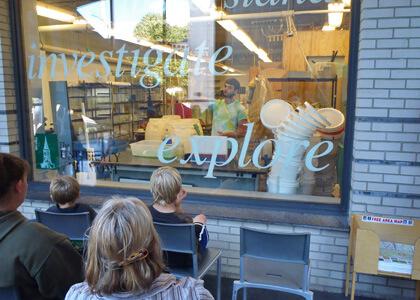Science centers provide a much needed outlet for bringing scientific research to the public. They are a platform where learning is fun, and each person can have a different experience. However, it can be difficult to keep the visitor experience fresh and up-to-date with what is happening now in science.
This is the issue that Dr. Jason Stockwell, Director of the Rubenstein Ecosystem Science Laboratory, and ECHO Lake Aquarium and Science Center at the Leahy Center for Lake Champlain had in mind when they created the joint science-education fellowship. This fellowship allows a graduate student working in research (like me) to see through the eyes of public science educators (like the folks at ECHO). The fellowship helps me learn from ECHO educators how to translate science to a public form and, in turn, helps ECHO develop a lasting system to provide exhibits and programs aimed at showing the public current, cutting-edge research.
Now in its second year, the fellowship is focused on clear goals. The first goal is to connect teens and adults—a group that can be difficult to impress in a science center—to current science. We are doing this in two ways: first, by updating current exhibits and programs to include ongoing lake research at RSENR and elsewhere, and second, by developing a space for science translation just outside of the Rubenstein Ecosystem Science Laboratory within ECHO.
Though these are significant steps, it is important to remember that science is always changing. For this reason, my second goal as the science-education fellow is to create a symbiotic relationship between ECHO and the Rubenstein Laboratory where ECHO can benefit from the knowledge and expertise of RSENR researchers while the Laboratory can benefit from the educational expertise at ECHO. This relationship will allow us to hone our education skills by presenting our work to the 150,000 people who visit ECHO yearly. Conversely, ECHO visitors get to learn about the most current research on Lake Champlain.
To achieve these goals, one of my primary objectives is to develop a platform from which science can be presented at ECHO. At the Rubenstein Laboratory, there is a large window that looks directly into the communal “wet lab” where ongoing experiments can be easily seen at any given time. For years, this space has been underutilized by both ECHO and the Rubenstein Laboratory.
My plan is to make the wet lab a human exhibit for ECHO visitors, where researchers can interact with the public simply by going about their work. The installation of a large monitor on the outside of the window with speakers and a microphone will create a “stage” for demonstrations of laboratory techniques and provide an arena for direct conversations with the public about research at the University of Vermont.
Currently, I am trying out the window space by presenting my ongoing Master’s research in a demonstration titled “Creatures of the Deep.” Through this demonstration, I introduce people to my study organism, Mysis diluviana, a small shrimp-like invertebrate living in Lake Champlain. So far, it has been great to watch visitors’ excitement about my research and their genuine interest in learning not just about a new creature but about how science works and what research is being done to protect the Lake that all Vermonters call their own. I am looking forward to a year of new experiences with ECHO and the opportunity to build something that could affect science education in Burlington for years to come.
